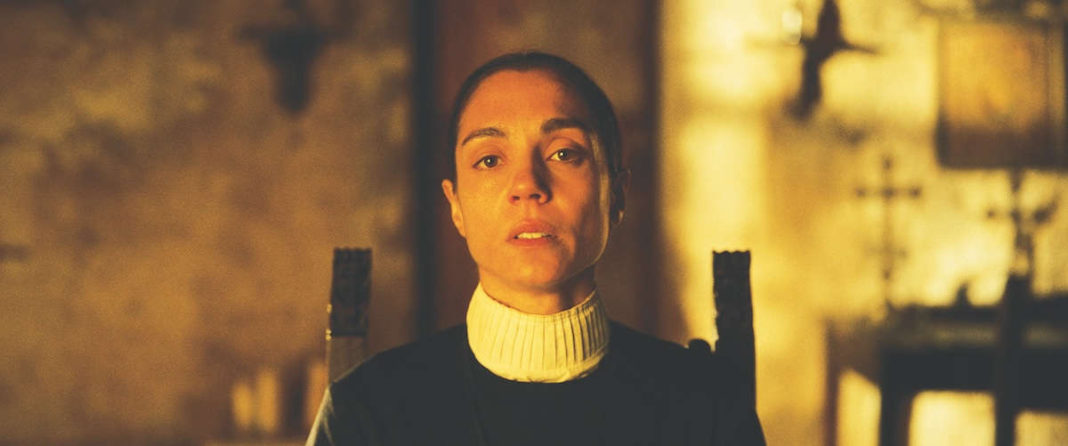Aside from specialty items by religious film producers, it’s unusual for general audiences to find major releases that concern themselves with spiritual matters and figures from organized religion. That’s one of the reasons why director Alejandro Monteverde’s new film Cabrini, a dramatization of the life and times of Roman Catholic nun Sister Frances Xavier Cabrini (1850-1917), is so noteworthy.
Mother Cabrini (portrayed by Italian actor Cristiana Dell’Anna) immigrates to the U.S. in 1889, accompanied by six other nuns with whom she has founded the Missionary Sisters of the Sacred Heart of Jesus. In her luggage is a personal recommendation by Pope Leo XIII (Giancarlo Giannini) for her mission to aid poor immigrants—specifically Italians—in their painful process of fitting into the United States’ burgeoning multicultural landscape.
In those days newcomers from Italy faced more or less the same barriers as other immigrants from Southern and Eastern Europe in the age of America’s “Manifest Destiny”—the historical label for the global ambitions of the newly industrialized United States. Highly promoted in its time, Manifest Destiny institutionalized a framework of reckless imperialism overseas and systemic domestic racism for anyone outside the era’s White Anglo-Saxon Protestant ruling hegemony. As the Italian nuns soon realize.
Cabrini arrives in New York’s Lower East Side at a time when Italian immigrants are depicted in the press as a horde of poor, illiterate, non-English-speaking, swarthy brutes, reeking of garlic. The missionary sisters lose no time in moving into the notoriously crime-ridden Five Points neighborhood of Lower Manhattan.
Their goal is to help a group of people commonly portrayed as menial laborers and “threats to American values” set up hospitals, schools and a sense of community in a hostile environment. The similarities between the jingoistic, openly bigoted America on display in Cabrini by filmmaker Monteverde, a native of Mexico, and the political extremes of the present-day U.S. are there for all to see.
Seemingly everywhere Cabrini turns, she is met by indifference and outright hatred for her social work. Tea-sipping Archbishop Corrigan (David Morse) dismisses her on gender grounds—so what if this woman was sent by the Pope? New York’s Mayor Gould (John Lithgow) calls Mother Cabrini a “puffed-up dago” and harasses her with vengeful building inspections. A Five Points pimp named Geno (Giacomo Rocchini) physically attacks the nuns for enlisting one of his prostitutes. Meanwhile, ordinary white businessmen are content to mock Mother Cabrini by publicly snorting in her face—to them all Italians are pigs.
In fact, Cabrini is loaded with hot-button social issues that stress the “then as now” aspect of her moral crusade: poverty, immigration, social welfare programs, racial bigotry, narrow-minded opposition, language barriers, street crime, sexism, anti-Catholic prejudice, child labor laws, and that old favorite, cruel and greedy bankers. Looks like a dress rehearsal for 21st-century politics.
Monteverde’s Cabrini—screenplay by Rod Barr from a story he wrote with the director—does a better job than most mainstream films in capturing the flavor of its early-20th-century settings. It’s in a league with Gangs of New York, Once Upon a Time in America, Days of Heaven and even The Godfather in that respect. And cinematographer Gorka Gómez Andreu’s tribute shots invoking photographer/social activist Jacob Riis add to the poignancy. The cinematography is almost too pretty at times—that’s the worst that can be said about the production values.
In modern-day secular terms, Cabrini achieves a gratifying balance between the social and the spiritual in Mother Cabrini’s zealous championing of equality for the underdog. In particular, actor Dell’Anna strikes a positively heroic pose as the woman who intended to “build an empire of hope” in her adopted country, for the marginalized and downtrodden.
Cabrini was canonized in 1946 as the first American saint, and patron saint of all immigrants. Today the Missionary Sisters of the Sacred Heart of Jesus is the largest charitable institution in the world. The American people were lucky to have her.
* * *
In theaters











